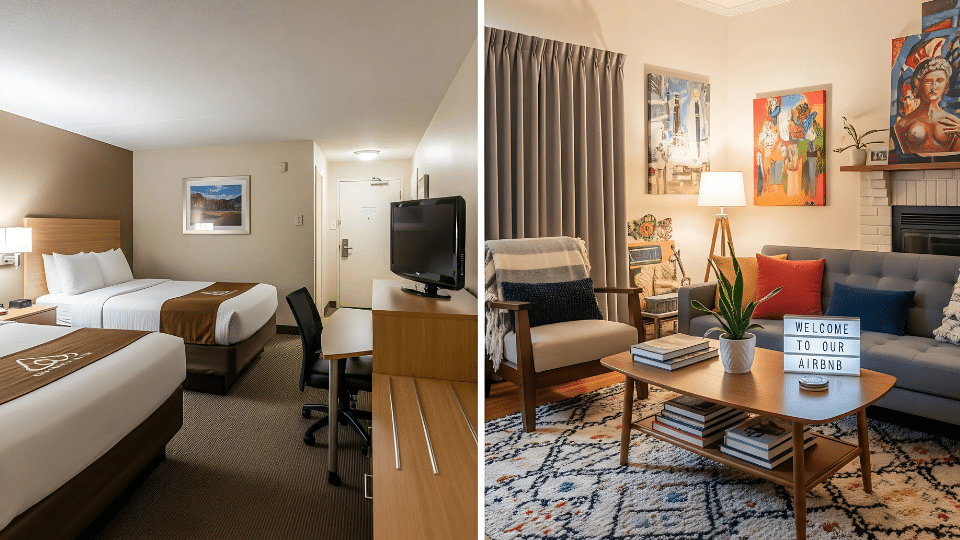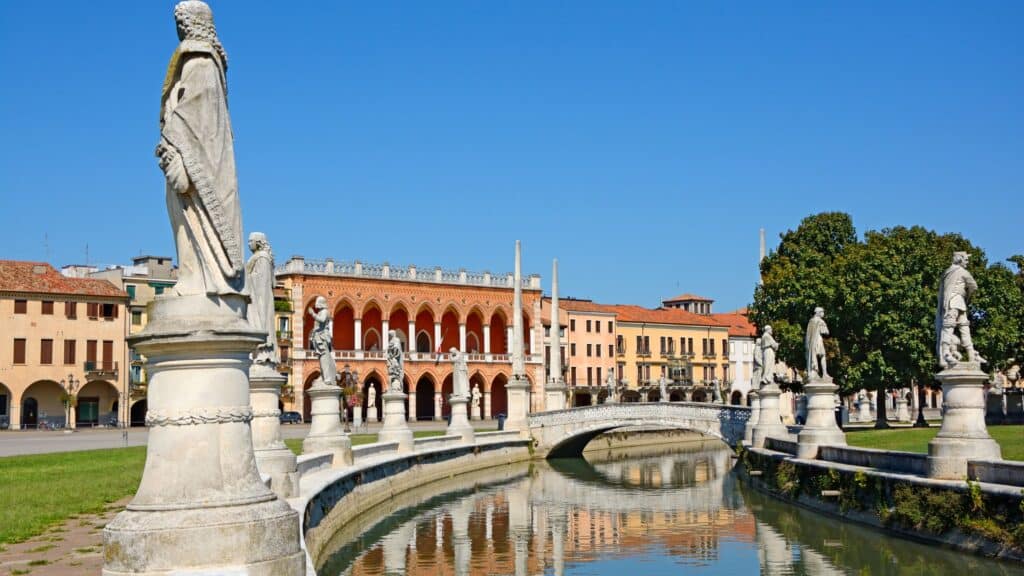Choosing between Airbnb vs hotel is one of the biggest travel decisions you’ll make. It affects your budget, comfort, and entire trip experience.
Most travelers struggle with this choice because both options have clear benefits and hidden drawbacks.
I’ll give you a complete, honest comparison based on real experiences and actual costs. No fluff or generic advice.
You’ll get personal stories from my best and worst stays, and specific situations when each option works better.
By the end, you’ll know exactly whether hotel vs Airbnb fits your travel style and budget.
What is Airbnb, and How Do Hotels Differ?
Airbnb is a platform where regular people rent out their homes, apartments, or spare rooms to travelers. You book directly with property owners who act as hosts. Properties range from single rooms in someone’s house to entire luxury villas.
Hotels are commercial businesses that operate dedicated lodging facilities. They employ professional staff, maintain consistent standards across locations, and offer standardized services like housekeeping, front desk support, and on-site amenities.
The key differences come down to ownership and operation. Airbnb connects you with individual property owners who may have one listing or several. Hotels are businesses with trained staff, corporate standards, and professional management systems.
Airbnb feels like staying in someone’s home because that’s exactly what you’re doing. Hotels feel like commercial accommodations because they’re designed specifically for short-term guests.
Airbnb vs Hotel: Quick Comparison Table
Before we explore the details, here’s a snapshot of how hotel vs Airbnb options stack up across key factors:
| FACTOR | AIRBNB | HOTEL |
|---|---|---|
| Cost | Lower nightly rate, but cleaning fees add up | Higher nightly rate, all-inclusive pricing |
| Space | Entire apartments or homes, multiple rooms | Single rooms, limited space |
| Amenities | Kitchen, washer, local neighborhood feel | Pool, gym, room service, concierge |
| Privacy | Complete privacy, no staff interruptions | Housekeeping, front desk interactions |
| Service | Self-service, host communication via app | 24/7 front desk, immediate problem-solving |
| Local Experience | Live like a local, residential areas | Tourist-focused, central locations |
| Best For | Long stays, families, groups, cooking | Short trips, business travel, luxury experiences |
This table gives you the basics. But real travel decisions need more context. Let me share what I’ve learned from years of staying in both.
Are Airbnbs Better Than Hotels?
There’s no simple yes or no answer. Are Airbnbs better than hotels? It depends completely on your trip type, budget, and what matters most to you.
Here’s how they compare for different travel situations:
1. Solo Travel
Airbnb wins for: Long stays, working remotely, cooking meals, and meeting locals.
Hotels win for: Safety in unfamiliar cities, easy check-in after late flights, and room service when sick
2. Family Vacations
Airbnb wins for: Multiple bedrooms, a kitchen for picky eaters, space to spread out, and laundry.
Hotels win for: Kids’ pools, family activities, housekeeping, connecting rooms
3. Romantic Getaways
Airbnb wins for: Private hot tubs, unique properties, cooking together, and complete privacy.
Hotels win for: Spa services, fine dining, turndown service, no chores
4. Group Trips
Airbnb wins for: Everyone stays together, shared common areas, split cooking duties, and lower per-person cost.
Hotels win for: Individual privacy, group booking discounts, meeting spaces, consistent wifi
The bottom line: Neither option is universally better. The best choice depends on your specific trip needs, group size, and personal preferences.
Bnb vs Hotels: Comfort, Safety & Convenience Factors
Beyond cost and space, daily practicalities matter most during your stay. Here’s how Airbnb and hotels handle the basics that affect your comfort and peace of mind.
1. Check-in and Checkout Flexibility
Airbnb offers self-check-in with codes and flexible timing, but you’re on your own if problems arise. Hotels provide 24/7 front desk service, luggage storage, and accommodate early or late check-in requests.
2. Security Considerations
Airbnb security varies by location, with no dedicated security staff, so you rely entirely on neighborhood safety. Hotels offer security cameras, staff presence, key card access systems, and safer parking facilities.
3. Problem Resolution
With Airbnb, you message the host and wait for a response with no immediate backup and DIY fixes required. Hotels let you call the front desk for instant help, have maintenance staff on-site, and can provide room changes when needed.
The winner depends on your comfort with self-service versus your preference for immediate assistance.
Pros and Cons of Airbnb Stays

| Airbnb Pros | Airbnb Cons |
|---|---|
| More space for the same money | Inconsistent quality |
| Kitchen saves on meals | Hidden fees add up |
| Local neighborhoods | No immediate help |
| Complete privacy | Cancellation risk |
| Better for groups | Self-service problems |
Pros and cons of Hotel Stays

| Hotel Pros | Hotel Cons |
|---|---|
| Professional service 24/7 | Smaller rooms typically |
| Predictable standards | Less local immersion |
| Immediate problem-solving | Higher daily costs |
| Full amenities package | No cooking options |
| Easy booking and check-in | Less privacy from staff |
When I Choose Airbnb Over a Hotel?
- Long stays (5+ nights): Hotel rooms feel cramped after a few days
- Group/family trips: Everyone stays together in shared living spaces
- Cooking at home: Save money and eat healthier with dietary control
- Neighborhood immersion: Shop local markets and experience authentic daily life
When I Choose a Hotel Over Airbnb?
- Short stays (1-3 nights): Cleaning fees make Airbnbs expensive for brief trips
- Safety concerns: Want security staff and well-lit central locations
- Full service needs: Room service, concierge help, and daily housekeeping
- Special occasions: Anniversaries or celebrations where I want pampering without chores
Conclusion
After years of staying in both Airbnbs and hotels, I’ve learned there’s no universal winner. The best choice depends on your trip style, budget, and what you value most.
Choose Airbnb for space, local experiences, and cooking flexibility. Choose hotels for reliability, service, and hassle-free stays.
My advice? Consider your trip length, group size, and comfort level with self-service. Match your accommodation choice to your travel priorities, not just the price tag.
What matters most to you when traveling? Saving money, local immersion, or full-service convenience? Your answer will guide you to the right choice for your next trip.
Frequently Asked Questions
Is Airbnb Cheaper than Hotels?
Not always. Airbnb vs hotel costs depend on the length of stay and hidden fees. Airbnbs often cost less for trips over 4 nights, especially with groups. Hotels can be cheaper for 1-2 night stays.
Which Is Safer, Airbnb or a Hotel?
Hotels typically offer better security with staff, cameras, and central locations. Airbnb safety varies by property and neighborhood. Always check reviews and location before booking either option.
Are Hotels More Reliable than Airbnbs?
Yes. Hotels have consistent standards and immediate problem resolution. Airbnbs can vary greatly in quality and host responsiveness. Hotel vs Airbnb reliability strongly favors hotels.







